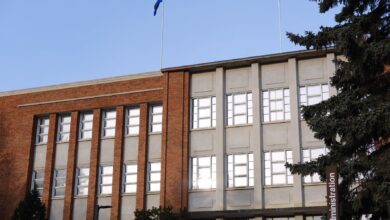Students Council seats found to be incorrectly distributed for past three academic years
 Christina Varvis
Christina VarvisDue to human error, the Faculty of Engineering is currently short of one councillor on Students’ Council.
The Faculty of Science has been over-represented on Students’ Council for the past two years at the cost of other faculties’ seats, and will continue to be overrepresented in 2016-17. Since 2013-14, the Faculty’s fall head count has reduced from 6,645 students to 5,936 students, according to data from Engineering councillor Brandon Prochnau.
Council’s 32 seats are distributed proportionally among faculties — the bigger the faculty, the more seats it gets. The Students’ Union’s (SU) Bylaw 100 explains a basic cross-multiplication calculation to divide seats among faculties to ensure proportional representation. Although the calculation is supposed to be used every year to update Bylaw Schedule 100, the most recent calculation shown is from 2013-14. Brandon Christensen, Medicine and Dentistry councillor, said there is no evidence that the calculations have been run since 2013-14.
According to the SU’s Bylaw 100, it’s the Chief Returning Officer’s (CRO) responsibility to calculate council seat distribution before February 15 of each year, and to present these calculations to Students’ Council. Students’ Council is responsible for ensuring that the CRO carries out the task. Jessica Nguyen, the most recent CRO who held the position in 2014-15 and 2015-16 and was therefore responsible for the calculations for the 2015-16 and 2016-17 years, was contacted about the calculations but was unable to be reached for a formal response.
Prochnau announced in the August 9 sitting of Students’ Council that enrollment data from 2014-15 shows the Faculty of Agricultural, Life, and Environmental Sciences (ALES) should have had two council seats instead of one due to increased enrollment. Science was supposed to reduce from seven to six seats.
Then in 2015-16, Prochnau said ALES was supposed to lose its second seat to the Faculty of Nursing, which was supposed to have two seats instead of one.
Now in 2016-17, Nursing is supposed to lose its extra seat to Engineering, which currently has four seats. Because of the mishap, Students’ Council does not accurately represent students, and is “not exactly accountable,” Prochnau said.
“We were like, ‘whoa,’ because basically three faculties that could have had a stronger voice on (Students’ Council) were chopped off, and another faculty … was overrepresented,” Prochnau added. “We were pretty floored at that one.”
SU President Fahim Rahman said the situation “isn’t ideal but it’s not the worst thing there is.”
“We’ve still been able to conduct our business effectively in the past few years,” he said.
Students’ Council seats will not be redistributed this year, although a new framework is being created for distributing seats with a bracket system, which will allocate seats according to each faculty’s population without the 32-councillor cap. The framework’s first readings state that faculties will be granted one seat for their initial 1,500 students, and will be granted one more seat for every additional 1,000 students. For example, Science, a faculty of roughly 5,700 students, would have six seats. ALES, housing a little more than 1,500 students, would have two council seats instead of one.
Prochnau said the mishap has been a “good lesson” that more oversight is needed during elections.
“It’s kind of nice (to bring this to Council) because we thought it was all good and jolly, but it’s actually not,” he said.



